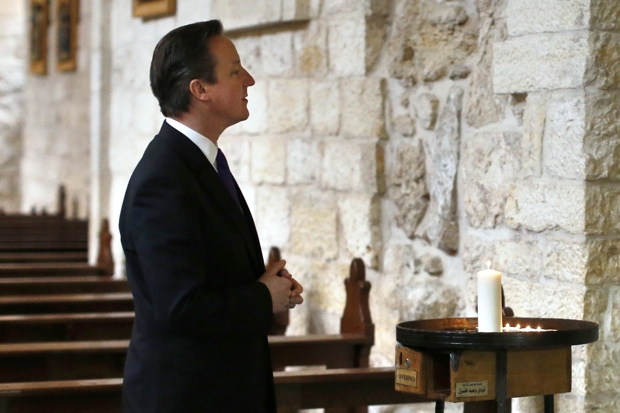[audioplayer src=”http://traffic.libsyn.com/spectator/TheViewFrom22_16_April_2014_v4.mp3″ title=”James Forsyth and Fraser Nelson discuss politics and religion” startat=636]
Listen
[/audioplayer]If Ed Miliband wins the next election, he’ll be Britain’s first atheist Prime Minister. It is a sign of how social attitudes have changed that Miliband feels comfortable wearing his atheism on his sleeve. He has not received the kind of criticism that Michael Foot and Neil Kinnock did when they professed that they did not believe in God. Atheism doesn’t seem as dangerously counter-cultural as it did in the 1980s. Nick Clegg is also a self-declared atheist. This leaves David Cameron as the only major party leader who believes in God.
But Cameron has never come across as a faith-based politician. He rather self-deprecatingly borrowed Boris Johnson’s line that his faith is ‘like reception for Magic FM in the Chilterns: it sort of comes and goes’. He stressed that he was a typical Church of England Christian — not a George W. Bush evangelical, in other words. He told an interviewer who asked about his faith in 2009: ‘Do I drop to my knees and ask for guidance whenever an issue comes up? No, I don’t.’
In private, Cameron doesn’t discuss his religious beliefs with many people. One person who has known him since he entered the House says: ‘I’ve talked to David about many things, but never God.’ Cameron has even been heard to call the Department of Work and Pensions as the Department of Worship and Prayer, a slightly sneering reference to the shared Christian faith of the Secretary of State, Iain Duncan Smith, and the pensions minister, Steve Webb. One minister, a believer, complains: ‘At cabinet, for most of them, when you even mention religion or God, they look at you as if you believe in fairies.









Comments
Join the debate for just £1 a month
Be part of the conversation with other Spectator readers by getting your first three months for £3.
UNLOCK ACCESS Just £1 a monthAlready a subscriber? Log in